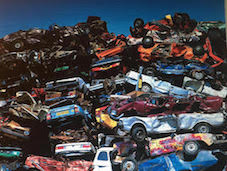Columban Competition 2020 - Tackling our Throwaway Culture

Cars on scrapheap
First Prize Article
Throwing away our throwaway culture
By Kit Bell
I think about our "throwaway culture" every day before bed, when I take off my makeup with a cotton pad. I have considered buying a reusable set, but I just never get round to it. It's alright, though - when I throw my cotton pads in the bin, they're gone, right? They aren't my problem anymore.
One of the biggest factors in our throwaway culture is the fact that we don't think about where our rubbish goes when we're done with it. As far as we know, it's out of our lives. It's as if we're babies with no object permanence, assuming rubbish disappears when it goes in the bin.
Imagine if, every time I used a cotton pad, it stayed in my bedroom, never getting taken away. Soon enough, my room would fill up. There wouldn't be space for me anymore. Just one or two tiny things every day adds up to a lot, and that's something we can't seem to grasp. That isn't surprising, seeing as our rubbish rarely stays our problem for long; it's cheaper for us to ship our rubbish to other countries, and make it their problem, than to bother disposing of it ourselves. Easy enough, when you have the money.
Money is another driver fuelling the consumer mind-set. We want everything cheaper, and so do companies. Why make a more expensive product that will only be purchased once, when you could reel your customers in with cheap disposables and low-quality items that keep them coming back for more?
It seems impossible to break out of this cycle of fast fashion, short-term items, and disposables. Clothes recycling initiatives offering vouchers might be enough to convince us - but then we just reinvest these in more unsustainable outfits, feeling good about the idea of our clothes serving those in greater need whilst ignoring the fact that we're flooding them with our excess. We donate to charity shops, unaware that if items aren't sold within a month, they're discarded anyway. Even our attempts to fight disposables with reusables is pointless if we don't focus on the sustainability of their production.
When asked for his opinion on the matter, Pope Francis offered a unique take: that our careless attitude toward things we no longer need has spread past material possessions. The way we treat those on the edge of our society is all the proof we need to see that he is right - the elderly, left to fade into an undignified end; those with disabilities, left to struggle until they can no longer cope; the homeless, left to scavenge for our cast-offs, as if we can offer nothing else. The invisibility of those we have no use for shows how much the consumer mindset has poisoned our humanity. We simply throw away people we think we don't need, whilst keeping those who promote this toxic ideal.
Toxicity is found not just in our attitudes, but in the products we cast aside. Think about the last time you walked past a nappy in the street, discarded hurriedly after use. The bacteria-ridden contents of these disposable nappies aren't washed away to be treated like adult waste, as would be the case with their cloth counterparts; instead, they're left to produce harmful gases in landfills, or fester in the street. Often, you'll walk by the same cast-off so many times that it becomes part of your everyday landscape. You might casually comment on how long it's been there, but you probably won't stop to imagine that this is the same case for the three billion others thrown into landfill each year in the UK. That's over 4,000 per child per year, compared to just 20 reusables overall.
The landfills we speak of are not on our land, of course. As mentioned earlier, the majority of our rubbish is shipped to developing countries such as Malaysia, Thailand, and Vietnam, where disposal regulations aren't as strict. One of the key points made in Laudato Si' was that the poor are disproportionately affected by climate change, and by taking advantage of their need for money, we fill their land with our rubbish, allow their air to become polluted, and dirty the water they need to survive. This is not showing love to our neighbours. This is not caring for creation. This is an abuse of the power we hold in society, choosing to throw away people and land over cutting back on our extravagant lifestyles.
When we decide that we, as individuals, cannot change this, we ignore the plight of those this affects. We are not acting as the protective stewards that we were created to be. In writing his encyclical, Pope Francis draws on the knowledge of many countries to emphasise that once we are united, we can tackle this issue. Indifference and selfishness are the only true drivers of this throwaway culture - so maybe it's time for a change of heart.
Kit Bell is a pupil of All Saints Catholic School in Sheffield.


















